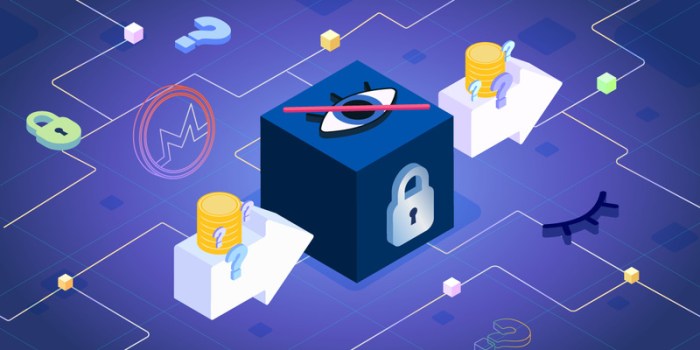Privacy coins are the new kids on the blockchain, offering a cloak of secrecy to your digital transactions. Dive into the world of privacy coins where anonymity reigns supreme and data protection is top priority.
From the technology that keeps your identity hidden to real-world examples of how these coins are changing the game, get ready to explore a whole new level of cryptocurrency security.
Introduction to Privacy Coins

Privacy coins are a type of cryptocurrency that focus on providing enhanced privacy and anonymity for users during transactions. These coins utilize various technologies such as ring signatures, stealth addresses, and coin mixing to ensure that the identity of the sender, recipient, and the amount transacted remain private and untraceable.
Examples of popular privacy coins in the market include Monero (XMR), Zcash (ZEC), and Dash (DASH). These coins have gained popularity due to their emphasis on privacy features, making them appealing to users who prioritize anonymity in their financial transactions.
Privacy in cryptocurrency transactions is crucial as it helps protect users from potential surveillance, data breaches, and identity theft. By utilizing privacy coins, individuals can have greater control over their financial information and prevent unauthorized access to their transaction history.
How Privacy Coins Ensure Anonymity
Privacy coins utilize advanced cryptographic technology to ensure user anonymity by obscuring transaction details and protecting sensitive data from unauthorized access. These coins offer enhanced privacy features compared to traditional cryptocurrencies like Bitcoin, making them popular among individuals seeking heightened confidentiality in their financial transactions.
Technology Behind Privacy Coins
Privacy coins such as Monero, Zcash, and Dash implement various privacy protocols like ring signatures, stealth addresses, and zero-knowledge proofs to obfuscate transaction information and shield user identities. Ring signatures mix the spender’s transaction with others to create a group signature, making it impossible to determine the exact source of the funds. Stealth addresses generate unique, one-time addresses for each transaction, enhancing privacy by preventing address linkage. Zero-knowledge proofs allow for the verification of transactions without revealing any sensitive data, ensuring confidentiality while maintaining the integrity of the blockchain.
Comparison of Privacy Features
– Monero: Utilizes ring signatures, stealth addresses, and confidential transactions to provide complete anonymity for users.
– Zcash: Implements zk-SNARKs to enable shielded transactions where the sender, recipient, and transaction amount remain confidential.
– Dash: Offers PrivateSend feature that mixes coins through masternodes to enhance privacy and fungibility.
Examples of User Data Protection
– Monero’s ring signatures and stealth addresses make it nearly impossible to trace transactions back to individual users, ensuring privacy and anonymity.
– Zcash’s use of zk-SNARKs allows for selective transparency, enabling users to disclose transaction details while still maintaining confidentiality.
– Dash’s PrivateSend feature provides a decentralized method for mixing coins, enhancing privacy and obfuscating transaction history.
Use Cases of Privacy Coins

Privacy coins are utilized in various industries and scenarios where maintaining anonymity and confidentiality of transactions is crucial. The advantages of using privacy coins in these specific cases include enhanced security, protection of sensitive financial information, and safeguarding user privacy.
E-commerce Transactions
- Privacy coins are commonly used in e-commerce transactions to ensure that sensitive payment information remains confidential.
- Advantages include safeguarding customer data from potential hacks or breaches, reducing the risk of identity theft, and providing a secure payment method for online purchases.
- Real-world examples include online retailers accepting privacy coins as a form of payment, allowing customers to make purchases without revealing personal financial details.
Cross-Border Payments
- Privacy coins are also used for cross-border payments, as they offer a secure and private way to transfer funds internationally.
- Advantages include faster transaction speeds, lower fees compared to traditional banking methods, and circumventing currency exchange restrictions in certain regions.
- Real-world examples include individuals and businesses using privacy coins to send and receive payments across borders without the need for intermediaries or third-party involvement.
Protecting Financial Privacy
- Privacy coins are employed to protect financial privacy by allowing users to conduct transactions without revealing their identity or transaction history.
- Advantages include ensuring confidentiality of financial activities, preventing surveillance or tracking of spending habits, and maintaining anonymity in financial dealings.
- Real-world examples include individuals using privacy coins to secure their financial information from prying eyes and unauthorized access.
Challenges and Criticisms of Privacy Coins
Privacy coins face several challenges and criticisms, especially in terms of regulations and concerns about their potential misuse.
Regulatory Challenges
Privacy coins have faced regulatory scrutiny due to their ability to facilitate anonymous transactions, which can be exploited for illicit activities. Governments and regulatory bodies are concerned about the lack of transparency in transactions conducted using privacy coins. This has led to debates on whether stricter regulations should be imposed on privacy-focused cryptocurrencies to prevent money laundering, tax evasion, and other criminal activities.
Criticisms on Potential Use in Illegal Activities, Privacy coins
One of the main criticisms surrounding privacy coins is their potential use in illegal activities. Critics argue that the anonymity provided by privacy coins can be misused by criminals to conduct illicit transactions without leaving a trace. This has raised concerns among authorities and financial institutions, leading to calls for increased oversight and regulation of privacy coins to mitigate the risks of illegal activities.
Concerns about Misuse of Privacy Coins
Another common concern is the misuse of privacy coins for nefarious purposes. While privacy coins offer enhanced privacy and security features for legitimate users, there is a fear that they could be exploited by bad actors for money laundering, terrorist financing, and other illegal activities. This has fueled skepticism and apprehension towards privacy coins within the regulatory and mainstream financial communities, prompting calls for greater transparency and accountability in the use of these cryptocurrencies.
